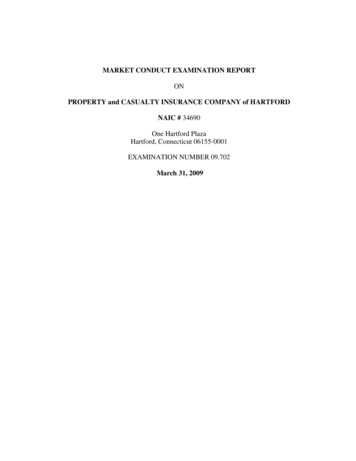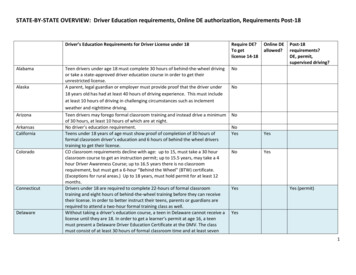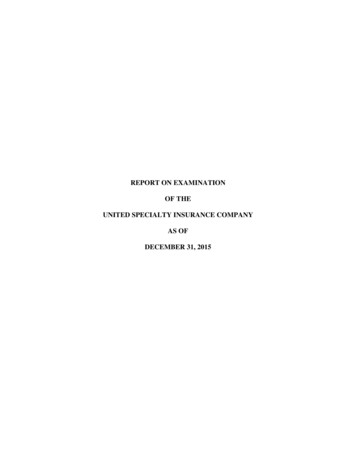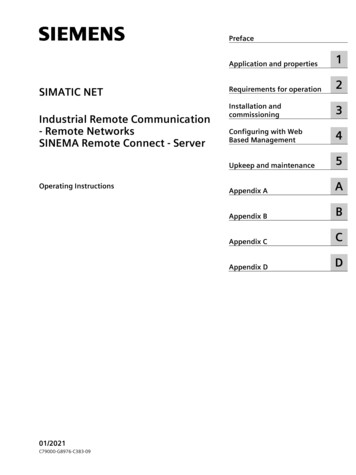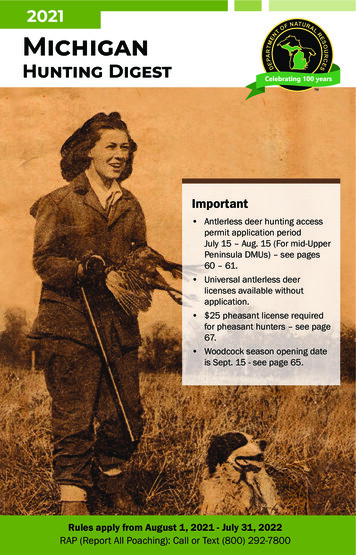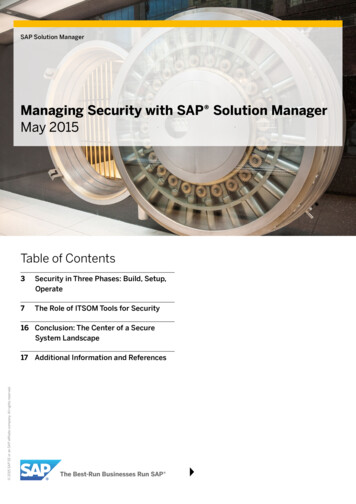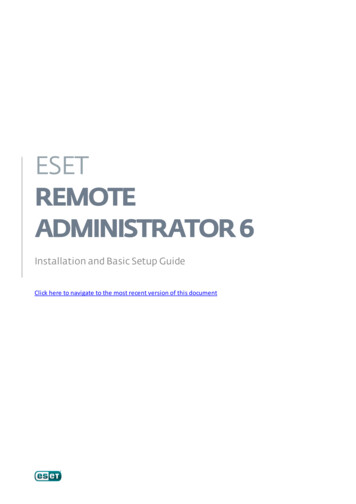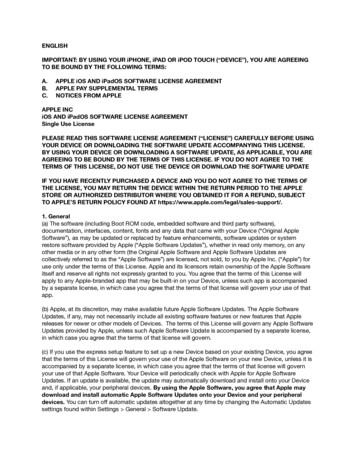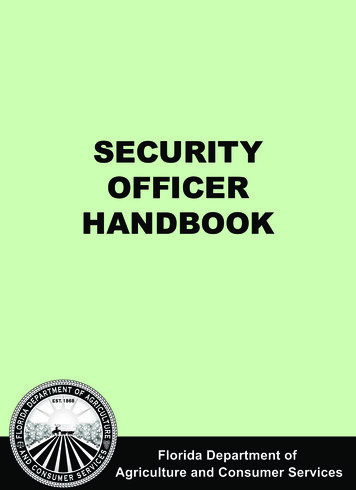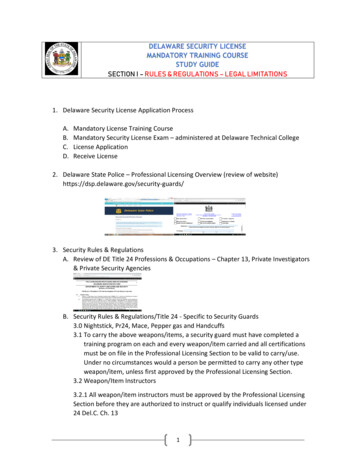
Transcription
DELAWARE SECURITY LICENSEMANDATORY TRAINING COURSESTUDY GUIDESECTION I – RULES & REGULATIONS – LEGAL LIMITATIONS1. Delaware Security License Application ProcessA.B.C.D.Mandatory License Training CourseMandatory Security License Exam – administered at Delaware Technical CollegeLicense ApplicationReceive License2. Delaware State Police – Professional Licensing Overview (review of . Security Rules & RegulationsA. Review of DE Title 24 Professions & Occupations – Chapter 13, Private Investigators& Private Security AgenciesB. Security Rules & Regulations/Title 24 - Specific to Security Guards3.0 Nightstick, Pr24, Mace, Pepper gas and Handcuffs3.1 To carry the above weapons/items, a security guard must have completed atraining program on each and every weapon/item carried and all certificationsmust be on file in the Professional Licensing Section to be valid to carry/use.Under no circumstances would a person be permitted to carry any other typeweapon/item, unless first approved by the Professional Licensing Section.3.2 Weapon/Item Instructors3.2.1 All weapon/item instructors must be approved by the Professional LicensingSection before they are authorized to instruct or qualify individuals licensed under24 Del.C. Ch. 131
4.0 Training Requirements4.1 Each person licensed as a security guard under 24 Del.C. Ch. 13 shall successfullycomplete a training program approved by the Board, and any such additionaltraining as the Board deems appropriate. Satisfactory completion of the trainingprogram shall be certified by mandatory testing with a passing grade of 75%. Thetest will be administered by a Board approved training/testing facility.5.0 Use of Animals - the use of animals is prohibited.6.1 In addition to those qualifications set forth in 24 Del.C. Ch. 13, no personrequired to be licensed under this chapter shall be issued a license, if that person hasbeen convicted of Assault III within the last three (3) years.6.2 For the purposes of 24 Del.C. Ch. 13, the Director of the Professional LicensingSection may deny an application, suspend, or revoke a license if the applicant orlicensee has been convicted of a misdemeanor crime involving moral turpitude. Amisdemeanor crime involving moral turpitude includes, but is not limited to, thefollowing crimes in the Delaware Code (or similar crimes under the laws of otherjurisdictions):6.2.1 Title 11 Crimes and Criminal Procedures Ch. 5 Specific Offenses:Sexual harassment;Indecent exposure in the second degree;Indecent exposure in the first degree;Incest;Unlawful sexual contact in the third degree;Unlawful imprisonment in the second degree;Shoplifting;Forgery;Falsifying Business Records;Bribery;Criminal Impersonation;Abandonment of a Child;Endangering the Welfare of a Child;2
Crimes against a Vulnerable Adult;Unlawfully Dealing with a Child;Endangering Children;Falsely Reporting an Incident;Lewdness;Prostitution;Patronizing a Prostitute; andPermitting Prostitution.Title 16 Health and Safety Ch. 11 Nursing Facilities and Similar Facilities: 6.2.2.1 §1136Violations. Title 31 Welfare Ch. 39 Adult Protective Services:6.3 Anyone applying for licensure under 24 Del.C. Ch. 13 shall not be issued a license ifthey have any pending criminal charge(s) for any crimes listed in this Chapter.6.4 The Director of the Professional Licensing Section may suspend anyone licensedunder 24 Del.C. Ch. 13 who has been arrested and that arrest could result in theconviction of any misdemeanor or felony as described in this Chapter.7.1 Anyone applying for licensure under this chapter may be rejected without refund, orhave their license revoked, for knowingly omitting any criminal history, other materialinformation or for making a false statement on their application.10.0 Uniforms, Patches, Badges, Seals, Vehicular Markings10.1 No person licensed under 24 Del.C. Ch. 13 shall wear or display any uniform, patch,badge, seal, vehicle and the markings, letterhead, business card, advertisement, or otherform of publication unless first approved by the Board of Examiners.10.2 The use of “patrol” and/or “officer” shall first be preceded by the word “security”.Under no circumstances shall any item contain the seal or crest of the State of Delaware,any state of the United States, the seal or crest of any county or local subdivision, or anyfacsimile of the aforementioned seals or crests.10.3 No such items will be approved by the Board if the item will mislead the public byconfusing the licensee and/or his/her employees with official law enforcement agenciesand/or personnel.3
10.4 All uniforms displaying a patch must contain an approved patch that is not genericin nature. The patch must have the name of the agency printed on it.10.5.1 No vehicle utilized for purposes covered by 24 Del.C. Ch. 13 shall have anappearance that creates a reasonable likelihood of confusion with a police vehicle usedby the Delaware State Police or a law enforcement agency of any state or governmentalsubdivision. The Board of Examiners shall have discretion to review the appearance ofvehicles, and to make comparisons with known law enforcement vehicles, in order toenforce this Rule.10.5.2 In the event that a vehicle is not approved by the Board of Examiners pursuant tothis Rule, the Board may indicate what changes to the vehicle appearance would besufficient to satisfy the standard and criteria set forth above.10.5.3 Auxiliary lights on vehicles used for patrol shall be amber and/or clear only. Use ofsirens is prohibited.12.2 The Professional Licensing Section has the right to inspect any security guard at anytime they are on their respective post. The office of any private investigative agency,private security agency, or armored car agency may be inspected during normal workinghours without notice.1308 Emergency suspension.(a) The Director may, without notice or hearing, issue a suspension of a license orregistration upon a finding that an emergency exists that requires immediate action toprotect the health and safety of the public. Such suspension shall be effectiveimmediately.(b) Any person whose license has been suspended on an emergency basis, uponapplication to the Board, shall be afford a hearing within 30 days, but not more than 90days. Upon the conclusion of the hearing, the suspension shall be continued, modified orrevoked within 30 days of the hearing.1310 Notifications.(a) Notification shall be made to the Section within 14 days after the change of addressof any person licensed under this chapter.(b) Any person licensed or issued an identification card under this chapter shall,excluding weekends and holidays, notify the Board within 5 days of any arrest whichcould result in a misdemeanor or felony conviction. Failure to report may result in thesuspension or revocation of a license.(c) Any person licensed under §§ 1318, 1319 and 1320 of this title shall report to theBoard within 5 days of any instance of violation of this chapter or any rule or regulationby their employees licensed under this chapter.4
(d) Any person licensed under §§ 1318, 1319 and 1320 of this title shall report to theSection a current address, telephone number and name of the employee managing theoffice. In the event there is not an office within the State, then the address, telephonenumber and name of the compliance agent for the business shall be reported. Thecompliance agent shall maintain all records including personnel for all agency businesswithin the State and make them available to the Section upon demand within 48 hours.1314 Security guard registration requirements.Anyone who wishes to be licensed, under this chapter, as a noncommissioned securityguard, must meet and maintain the following requirements:(1) Must be at least 18 years of age;(2) Must not have been convicted of any felony;(3) Must not have been convicted of any misdemeanor involving a theft-related offense,drug offense, or moral turpitude, within the last 7 years, and:a. There are no more than 2 of such misdemeanors during such person's lifetime; andb. No misdemeanor conviction occurred during or as a result of employment in acapacity regulated by this chapter.(4) Must not have been, as a juvenile, adjudicated delinquent for conduct which, ifcommitted by an adult would constitute a felony, unless and until that person hasreached his or her twenty-first birthday;(5) If served in the armed forces, must not have been dishonorably discharged;(6) Must not be a member or employee of any law-enforcement organization, asdefined by the Council of Police Training;(7) Must meet and maintain the qualifications set and approved by the Board ofExaminers.1323 Surrender of expired, revoked or suspended license; loss or destruction of license.(a) Any person to whom the Board issued a registration or license under this chaptershall surrender such registration or license and all duplicate copies which have expired,or been revoked, suspended or surrendered.(b) Any person issued a registration or license by the Board that is lost or destroyedmust inform the Section and at the discretion of the Director, a duplicate may be issued.§ 1324 Identification card.Anyone required to be licensed under this chapter shall be issued, by the Board ofExaminers, an identification card which shall expire and be renewable on the fifthanniversary date of the birth of the applicant next following the date of its issuance,unless the birth date is February 29, in which event the license shall expire and berenewable on February 28 every fifth year.5
1325 Possession of identification card.Any person who has been issued an identification card by the Board of Examiners shallbe required to have such card in their possession while in the performance of theperson's duties.1326 Identification card; offenses.(a) For the purpose of identification of persons engaged in the conduct of a securityguard or armored car guard, each such person shall carry and show when requested anidentification card, which shall be issued by the Section. For the purpose of identificationof employees of a private security agency or armored car agency, upon examination ofemployee's statement and fingerprint cards, the Section shall furnish an identificationcard.(b) No person licensed under this chapter or the officers shall wear, carry or accept anybadge or shield purporting to indicate that such person is a security guard, armored carguard or that such person performs any such service, or may, while in uniform and whileon the premises of the employer of the licensee where the security guard or armored carguard is so acting, wear a badge or shield inscribed by the specifications set forth in therules and regulations of the Board.(c) No person licensed under this chapter shall issue identification cards to any personother than a bona fide employee or shall sell, issue, rent, loan or distribute badges ormembership cards indicating that the holder thereof is a security guard, armored carguard or is engaged in the private security or armored car business to any person orpersons other than those lawfully entitled to such identification cards.(d) Any person to whom an identification card has been issued in accordance with thischapter, shall surrender the identification card to the Section:(1) Upon termination of employment, unless for a security guard who transfersemployment to another private security agency; or1328 Enforcement of chapter; jurisdiction.All police agencies and law-enforcement officers of this State may carry out this chapterand enforce compliance therewith. Justices of the Peace Courts shall have jurisdictionover violations under this chapter.1329 Disciplinary proceedings; appeal.(a) Grounds. — Subject to the provisions of this chapter, the Director pursuant to theauthority of the Board may impose any of the following sanctions (subsection (b) of thissection) singly or in combination when it finds a licensee or identification card holder isguilty of any offense described herein:(1) Acting as a security guard, armored car guard or private investigator without anidentification card; or(2) Operating a private security agency, private investigative agency, or armored caragency without a license; or6
(3) Failure to comply with firearms requirements pursuant to § 1321 of this title; or(4) Obtaining criminal charges or convictions pursuant to §§ 1314, 1315, 1316, 1317,1318, 1319, 1320 of this title; or(5) Failure to comply with inspection and subpoena requests pursuant to § 1307 of thistitle; or(6) Failure to notify the Professional Licensing Section of any arrests; or(7) Failure to keep identification card, badge or shield on your person while in theperformance of your person while in the performance of your specific duties; or(8) Failing to surrender a suspended or revoked license, or identification card; or(9) Submitting false or fraudulent information material to any application for a license oridentification card; or(10) Failure to abide by the Board's firearms certification and recertification trainingrequirements; or(11) Using a firearms instructor that has not been approved by the Board; or(12) Violating any provision of this chapter or any rule or regulation promulgated by theBoard.(b) Disciplinary sanctions. —(1) Permanently revoke a license, or identification card;(2) Suspend a license or identification card;(3) Issue a letter of reprimand;(4) Refuse to issue a license, or identification card;(5) Refuse to renew a license or identification card;(6) Issue an emergency suspension;(7) or otherwise discipline.4. Legal Limitations for Security Guards in DelawareA. Define Peace Officer in Delaware Police Officer Fire Marshall Animal Control Officer ConstableB. Detain vs. Arrest A security guard is not a Peace Officer and has no more power of arrest thanan ordinary citizen. A citizen can make an arrest for a breach of the peaceoccurring in his presence, but traffic violations are not a breach of the peace.A security guard cannot make an investigative stop of a citizen to determineif there is a breach of the peace, except to detain a suspected shoplifter for areasonable period of time until a police officer comes. It is a matter of deep public concern when one citizen assumes theresponsibility of arresting another citizen. Arrests made by private citizensare fraught with grave danger to the public tranquility, peace, and individual7
freedom. Accordingly, the right of one citizen to arrest another citizenagainst his will is very limited.C. Retail Theft (Shoplifting) – DE Title 11, Chapter 5 § 840 Shoplifting; Class G felony; Class A misdemeanor. (a) A person is guilty of shoplifting if, while in a mercantile establishment inwhich goods, wares or merchandise are displayed for sale, the person: (1) Removes any such goods, wares or merchandise from the immediate useof display or from any other place within the establishment, with intent toappropriate the same to the use of the person so taking, or to deprive theowner of the use, the value or possession thereof without paying to theowner the value thereof; or (2) Obtains possession of any goods, wares or merchandise by charging thesame to any person without the authority of such person or to a fictitiousperson with a like intent; or (3) Conceals any such goods, wares or merchandise with like intent; Like most states, however, Delaware has a retail theft statute that authorizesstore owners and their employees or agents (including security guards) tobriefly detain someone suspected of shoplifting. See 11 Delaware CodeSection 840(c) (“A merchant, a store supervisor, agent or employee of themerchant 18 years of age or older, who has probable cause for believing thata person has intentionally concealed unpurchased merchandise or hascommitted shoplifting as defined in subsection (a) of this section, may, forthe purpose of summoning a law-enforcement officer, take the person intocustody and detain the person in a reasonable manner on the premises for areasonable time.”)D. Investigative Stops & Breach of Peace An investigative stop occurs when a police officer briefly detains you becauseof a “reasonable suspicion,” based upon explainable, objective facts that youare engaged in criminal activity. A breach of the peace is an act or conduct inciting to violence or tending toprovoke or excite others to break the peace; a disturbance of the publictranquility by any act likely to produce violence. This type of crime wouldnormally be classified as “Disorderly Conduct.” A security guard cannot make an investigative stop of a citizen to determineif there is a crime/ breach of the peace, except to detain a suspectedshoplifter for a reasonable period of time until a police officer comes.8
Test Your Knowledge – Specific Examples In State v. Vouras , Crim.A. No. 80-02-002 (Del. CCP, July 29, 2980) (Trader, J.), a securityguard at Dover Downs was suspicious when he saw a man receive money from three personsand write something on his program each time. The security guard accosted the man andtook him to the security office. The guard ordered the man to empty his pockets, and thenfrisked him. The guard found 4,000 in cash and detained the man until the Dover policecould arrive.The Court of Common Pleas suppressed the evidence because the security guard “had noauthority to arrest the defendant” because he did not observe a breach of the peace.Vehicle/Traffic Violations committed in the presence of a security guardTraffic Violations are NOT a Breach of Peace. Security guards are expressly prohibited frommaking Traffic Stops on Vehicles.E. Alternative Options /Actions to Investigative Stops for Security Guards may include: Contact the police to request assistance. Maintain surveillance from a safe distance and/or If Closed Circuit Television (cctv) is available, record suspect details,descriptions, direction of travel, etc.F. Reasonable Suspicion vs. Probable Cause Reasonable suspicion means that any reasonable person would suspect thata crime was in the process of being committed, had been committed or wasgoing to be committed very soon. Probable cause means that a reasonable person would believe that a crimewas in the process of being committed, had been committed, or was going tobe committed. The difference between Reasonable Suspicion & Probable Cause is the stepbefore probable cause. At the point of reasonable suspicion, it appears that acrime may have been committed. The situation escalates to Probable Causewhen it becomes obvious that a crime has most likely been committed.9
Test Your Knowledge – Examples A store customer is observed picking up merchandise from a display rack orcounter and then moves to a secluded corner of the store, crouches down andappears to be placing items inside his/her jacket.This would be an example of a Reasonable Suspicion situation a Security OfficerGuard may encounter.A security guard observes, in person or via cctv, a customer actually holding astore product/merchandise in his/her hand and stuffing the item(s) in his/hercoat.This would be an example of a Probable Cause situation a Security Officer Guardmay encounter.10
DELAWARE SECURITY LICENSEMANDATORY TRAINING COURSESTUDY GUIDESECTION II – USE OF FORCEBecause Delaware-certified security guards often carry different types of weapons, it is important tobecome familiar with Delaware’s laws as they relate to use of force.1. Use of force can only be considered if/when all other options for a security guard to protecthim/herself have been exhausted and/or deemed impractical based on incident circumstances.All attempts to verbally and non-verbally dissuade a person from use a force should be madebefore considering actual force options.2. Use of force is not a personal decision nor an emotional decision. It is dictated by state law andthe circumstances surrounding the situation.3. As a security guard, you are authorized to protect: Yourself Others Property you are assigned to watchA. Delaware law specifies allowable use of force as follows, under Title 11. The followingsections are most relevant to the duties performed by security guards: Self-protection: Title 11 §464 Protection of others: Title 11 §465 Protection of property: Title 11 §4664. Contacting the police is a necessity when force is used against or by a security guard. Police willinvestigate the incident and determine the appropriateness of the force threatened or used andwill make arrests as appropriate.5. Security guards need to operate within a Use of Force Continuum which is a standard thatprovides law enforcement officers and civilians (security guards) with guidelines as to how muchforce may be used against a resisting subject in a given situation.A. A Use of Force Continuum must: Be obtained from the security company the guard is employed through. Must incorporate & follow Delaware state law. Provide officers with options or levels to escalate and/or de-escalate depending oncircumstances. The goal should always be to de-escalate.11
Example USE OF FORCE CONTINUUM – Security Response (Not Law Enforcement)1PRESENCE / Preferably Non-VerbalViolating / Non-Compliant2Verbal Request for ComplianceVerbal Non-Compliance/PassivelyNon-Compliant3Verbal Demand for Compliance While OutliningConsequences. Request Assistance & PoliceContinued/Increased NonCompliance (Verbal or NonVerbal)4Defense Measures – Soft Empty HandTactics/Control & Compliance Techniquesand/or Pepper Spray and/or Nightstick(depending on availability)Defense Measures – Hard Empty HandTactics/Control & Compliance Techniquesand/or Pepper Spray and/or Nightstick(depending on availability)Deadly Force Option (if available)PHYSICAL Action/Resistancetoward Security/Personal Safetyin Danger56LEVELSECURITY FORCE OPTIONS/LEVEL OF CONTROL(Security May Enter at Any Level ThatRepresents a Reasonable Response to thePerceived Threat Posed)12PHYSICAL Attack/Resistancetoward Security/Personal Safetyin DangerPHYSICAL Attack/Life Threatening(Lethal Consequences Possible)OFFENDER ACTIONS/LEVEL OFRESISTANCE(Offender May Initially Present atAny Level)
6. Other Factors to Consider Regarding Use of ForceA. The threat posed to the safety of the guard and/or other person(s) by the subject.Is the threat realistic?B. The offender’s ability and/or opportunity to inflict great bodily harm or death to the officerand/or others. Can the offender really do what he/she is threatening to do? But remember,never underestimate an opponent.C. The probability that great bodily harm or death to the guard and/or another will occur if theoffender is not restrained without delay. Will someone certainly get hurt if the guard doesnot do something right now?D. Is the offender under the influence of drugs or alcohol?E. What is the proximity to weapons to the guard and/or the offender?F. What other options does the guard have? Retreat?G. Seriousness of the offense in question. What did the offender do?H. What other pressing circumstances must the Guard attend to such as an injured person(s)?I. Examples of factors which may affect the guard and/or offender level of force selectedinclude: Age Size Relative strength Skill level Injury/exhaustion # of officers vs. # of offendersJ. Often overlooked as a level within the force continuum, uniform and appearance oftendetermine if a particular security guard is worth challenging. Demeanor and attitude arefactors that add to this dimension. Poor appearance and bad attitude yields lack of respect, greater chance of beingchallenged by others. Sharp appearance and professional attitude yields respect, less chance of beingchallenged by others. Security guards are paid to provide a service to a client, not to engage in personalbattles with disrespectful people.K. Verbal challenges from others may be common depending upon the environment. Knowingsecurity guards lack arrest powers, discourteous people may taunt security guards and try toget them angry. Security guards show more professionalism and fortitude when they ignorethe comments and simply remain professional.L. A rule of thumb to remember-- the minimum amount of force necessary for the situation isthe expectation when employing force options. Security guards who use excessive force aresubject to employment penalties, criminal arrest, and/or civil penalties.13
7. Weapons Other Than Firearms (Title 24, Chapter 13)A. Security guards are authorized to carry the following weapons/items if properly certified todo so: Nightstick or PR 24 Mace or pepper spray HandcuffsB. To be permitted to carry any of the aforementioned weapons/items, a training programmust be completed on each weapon carried and taught by a certified instructorrepresenting the manufacturer of the weapon/item.C. No items, other than those identified in this section, are authorized to be carried unless firstapproved by the Director of the Professional Licensing Section of the State Bureau ofIdentification.8. Firearms (Title 24, Chapter 13)A. Security guard licenses for certified armed guards are commonly known as “red cards.”B. Initial certification of armed security guards requires the completion of an approved 40-hourtraining course administered by a Board-approved certified firearms instructor.9. Contact and Cover (Back Up/Assistance) for Security GuardsA. Security guards will often respond to incidents where a second guard will respond as backup to the initially responding officer. Depending on circumstances or the potential forforce/violence additional guards may also respond. Such circumstances are “Contact &Cover” situations.B. If an individual guard responds and believes an actual or potential situation of force exists,assistance should be requested from back up guards and the police. There is no logic intrying to handle a situation of force/violence alone, especially when another security guardis available for assistance.C. When a subject(s) remains passive and/or compliant the first guard responding, known asthe “Contact,” should maintain focus on that person attempting to understand the nature ofthe actual incident, normally a conversation about incident details.D. The back-up or “Cover” guard has the responsibility of maintaining the overall safety of thescene to include watching the subject’s actions. The cover guard should also be alert toapproaching subjects or vehicles that may present a threat as the contact progresses. Thecover guard should not engage in actions that take attention away from what the contactguard is doing or initiate another series of events. If additional guards arrive during thecontact, they should also serve in the role of a cover unless specifically asked by the contactguard to accomplish a specific task.E. If a contact begins to escalate, where potential or actual force is initiated, then back-upguards or covers would then change their role to provide appropriate assistance.14
DELAWARE SECURITY LICENSEMANDATORY TRAINING COURSESTUDY GUIDESECTION III – ETHICS & PROFESSIONAL STANDARDS1. Role of a Security GuardA. Professional security guards are expected to act appropriately and present themselvesas professionals. This includes being courteous and approachable toward both youremployer and the public.B. Security guards must maintain the values of being honest, trustworthy and reliable.2. Personal AppearanceA. Exhibiting a clean, neat and professional appearance at all times when on-duty.B. Personal hygiene must be in check3. Uniform AppearanceA. Perhaps one of the most essential standards a security guard must meet and strive toexceed are appearance and uniform standards. The public immediately judges andaccesses the competence of that guard by how they first present themselves evenbefore they speak.B. Moreover, appearance and uniform standards are a safety issue for guards. Thoselacking professionalism, displaying poor appearance and failing to have uniformstandards are simply more likely to be challenged, verbally & physically.C. Uniform Standards which are often overlooked: Uniforms which are too loose, too tight, wrongly sized. Uniforms not worn correctly (hats, helmets). Dirty uniforms and/or stains. Shirts being untucked. Wearing uniform items & decorations improperly or excessively. Improper footwear.15
5.4. Essential Characteristics of a True ProfessionalA. Attitude and demeanor. A security guard should always: Display a demeanor which exudes confidence but not cockiness. Be polite and well-spoken whether interacting with the general public,superiors, co-workers, suspects, violators, etc. Keep their calm, especially during tense situations which are inevitable in thisprofession.B. Competence Security guards should strive to become experts in their field which setsthem apart from the rest of the pack. This means committing themselves tofully understanding and following; specific training, post orders, supervisordirectives, etc. Making certain people understand they know how to dotheir job.C. Accountability Security guards need to be accountable for their actions at all times.Mistakes should be acknowledged. Mistakes should not be hidden, blamedon others or covered up.D. Etiquette Security guard conversations; person to person, on the phone, etc. are animportant component of professional behavior. This means identifyingyourself by your full name, company and title. Be sure not to dominate theconversation and listen intently to the other party.5. Situational InfluencesA. The rules, regulations and laws that security guards must uphold apply equally to allmembers of the public.B. Consistency is mandatory and special favor must never be given, regardless of personalrelationships.C. All violations of laws and policies must be reported immediately to supervisors.Standards of ConductA. Security guards must conduct themselves with integrity and professionalism.B. Security guards must follow the specific rules and policies regarding conduc
DELAWARE SECURITY LICENSE MANDATORY TRAINING COURSE STUDY GUIDE SECTION I – RULES & REGULATIONS – LEGAL LIMITATIONS 1. Delaware Security License Application Process A. Mandatory License Training Course B. Mandatory Security License Exam – administered at Delaware Techn
